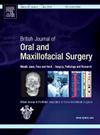Do we consent to change? An evaluation of oral and maxillofacial outpatient department dentoalveolar consent forms
IF 1.7
4区 医学
Q3 DENTISTRY, ORAL SURGERY & MEDICINE
British Journal of Oral & Maxillofacial Surgery
Pub Date : 2024-12-01
DOI:10.1016/j.bjoms.2024.08.010
引用次数: 0
Abstract
Obtaining informed consent before performing any dentoalveolar procedure is a professional, ethical, and legal obligation. Prior to this work, in this oral and maxillofacial department, no standardised consent process existed for dentoalveolar procedures. A targeted literature review established localised gold standards for dentoalveolar procedures, and retrospective data from 56 dentoalveolar consent forms over a four-week period assessed baseline compliance with these standards. Data analysis identified that risks of dry socket and trismus were documented in only 7% of cases, and maxillary tuberosity fracture was never documented. Thirty-three per cent of lower third molar cases did not include consent for inferior alveolar nerve injury. Findings were discussed in a departmental audit meeting, and a root cause analysis identified memory failure, repetition fatigue, and varying clinician knowledge and experience, as key drivers. The evidence base and localised gold standards were discussed. A standardised, bilingual, triple-copy dentoalveolar consent form was developed, including predefined indications, additional procedures, and risks, in a tick-box format. This form was presented to the Department of Patient Safety and Quality and gained local approval. Cases completed with the new form will now be evaluated against the localised gold standards, with a mixed-methods feedback survey investigating staff and patient opinions. Local processes for obtaining and documenting valid consent for dentoalveolar treatment were found to be inconsistent and frequently inadequate. Fifteen localised gold standards were set, and a new standardised consent form developed, which will be evaluated for effectiveness and acceptability.
我们同意改变吗?对口腔颌面部门诊部牙槽骨同意书的评估。
在进行任何牙槽手术之前获得知情同意是一项专业、道德和法律义务。在这项工作开展之前,本口腔颌面部还没有针对牙槽外科手术的标准化同意程序。一项有针对性的文献综述确立了牙槽外科手术的本地化黄金标准,并对为期四周的 56 份牙槽外科手术同意书的回顾性数据进行了评估,以确定这些标准的基本遵守情况。数据分析发现,仅有 7% 的病例记录了干槽症和三趾畸形的风险,而上颌结节骨折则从未记录在案。33%的下第三磨牙病例未包含下牙槽神经损伤同意书。部门审计会议对审计结果进行了讨论,并对根本原因进行了分析,发现记忆失败、重复疲劳以及临床医生的知识和经验参差不齐是主要原因。会议还讨论了证据基础和本地化黄金标准。我们制定了一份标准化、双语、三联式的牙槽骨手术同意书,其中包括预先确定的适应症、附加程序和风险,并采用了 "勾选框 "格式。该表格已提交给患者安全与质量部,并获得了当地的批准。使用新表格完成的病例现在将根据本地化黄金标准进行评估,并通过混合方法反馈调查调查员工和患者的意见。研究发现,当地获取和记录牙槽治疗有效同意书的流程并不一致,而且经常出现不充分的情况。我们制定了 15 项本地化黄金标准,并开发了新的标准化同意书,将对其有效性和可接受性进行评估。
本文章由计算机程序翻译,如有差异,请以英文原文为准。
求助全文
约1分钟内获得全文
求助全文
来源期刊
CiteScore
3.60
自引率
16.70%
发文量
256
审稿时长
6 months
期刊介绍:
Journal of the British Association of Oral and Maxillofacial Surgeons:
• Leading articles on all aspects of surgery in the oro-facial and head and neck region
• One of the largest circulations of any international journal in this field
• Dedicated to enhancing surgical expertise.

 求助内容:
求助内容: 应助结果提醒方式:
应助结果提醒方式:


